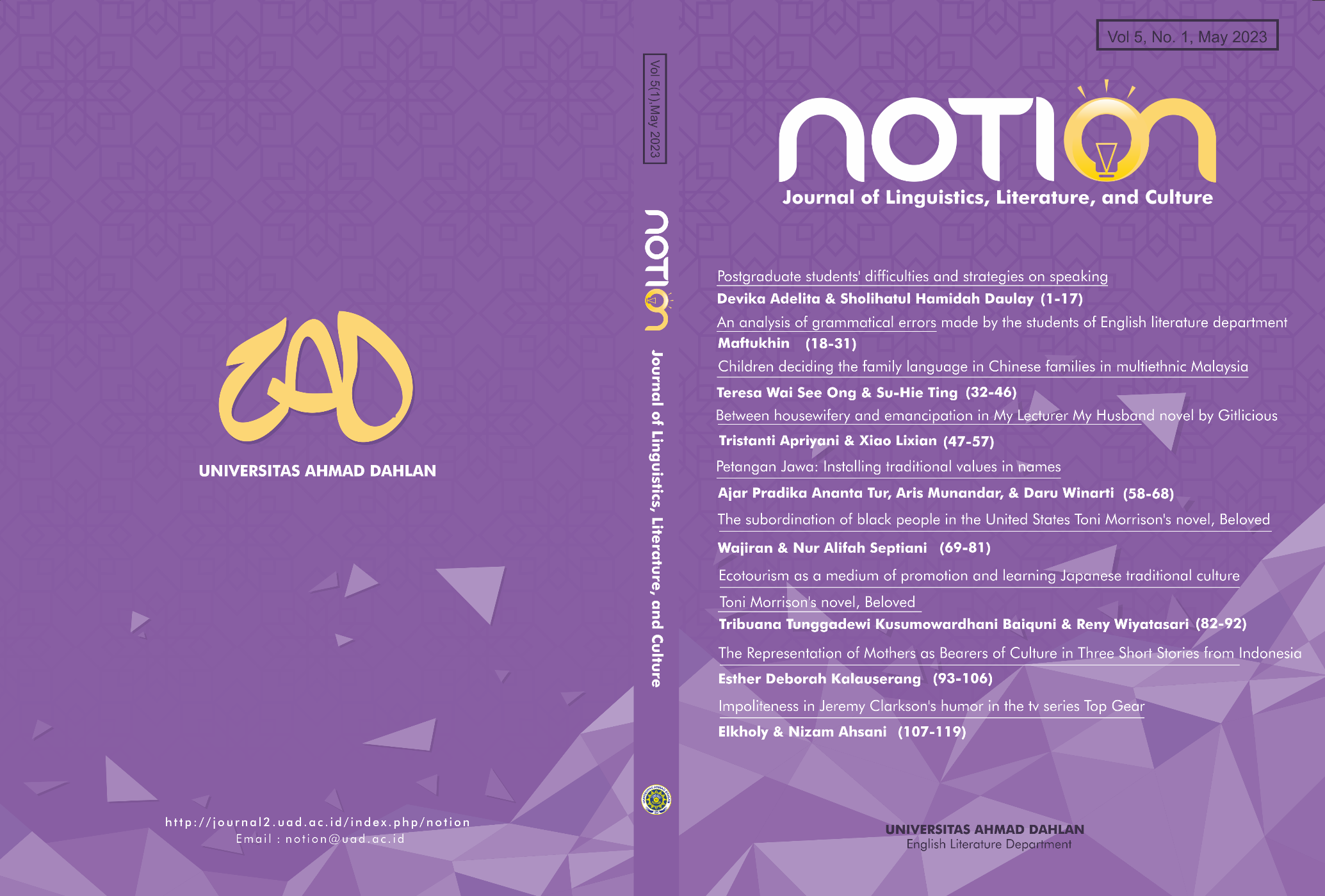Postgraduate students’ difficulties and strategies on speaking
DOI:
https://doi.org/10.12928/notion.v5i1.5827Keywords:
boarding school, second language acquisition, students' perceptionAbstract
In both first and second language acquisition environments, speaking is one of the four macro skills that must be cultivated as a way of effective communication. This study was aimed to explore the postgraduate students' perception of speaking skills and to examine the most dominant problems faced by the postgraduate students in speaking. As a result of this issue, a qualitative research design was developed as an action study in a regular course. Therefore, the subjects of this research were 10 postgraduate students in the first semester at the State Islamic University of North Sumatera. The data were collected by a questionnaire which applied in Google form. The researcher shared the Google form link with the students via WhatsApp message. In analyzing data, the researcher analyzed the data based on each question and answer of the respondent. The researcher analyzed the data one by one to get the point of the research. After that, the whole data are discussed using the theory and continued by concluding. The result shows that it was found that the post-graduate students faced many problems in speaking in the target language, such, pronunciation, grammar, vocabulary, fluency, and speaking. There were also other problems such as lack of confidence and did not have any brave to speak in the second language.
References
Ann, M. (1999). Improving Adult English Language Learner’s Speaking Skill. p.1. USA; National Centre for ESL Literacy Education.
Bailey, K. M. (2003). Speaking. Practical English Language Teaching. p. 35-54. New York: McGraw-Hill
Baleghizadeh, S. & Shahri, M. N. (2014). EFL teachers’ conceptions of speaking competence in English. Teachers and Teaching: theory and practice. p. 2. Routledge. https://doi.org/10.1080/13540602.2014.885702
Boonkit, K. (2010). Enhancing the development of speaking skills for non-native speakers of English. Procedia Social and Behavioral Sciences 2. p. 1306. Elsevier Ltd: Thailand. https://doi.org/10.1016/j.sbspro.2010.03.191
Cameron, L. (2001). Teaching Language to Young Learners. p. 1-32. Cambridge. Cambridge University Press.
Fasold, R. W & Linton, J. C. (2006). An Introduction to Language and Linguistics. p .160. Newyork: Cambridge University press
Febriyanti, E. R. (2011). Teaching speaking of English as a foreign language: Problems and solutions. Jurnal Bahasa dan Sastra, 1(2), p. 8.
Lestari, D. E. (2017). Teaching Pragmatics to Indonesian Learners of English. Metathesis, Vol. 1, No. 2, p.45. ISSN: 2580-2712
Maxom, M. (2009). Teaching English as a Foreign Language for Dummies. p. 204. Chichester, John Wiley & Sons, Ltd
Nazara, S. (2011). Students’ Perception on EFL Speaking Skill Development. Journal of English Teaching. Vol.1, No.1, p.32.
Rodríguez-González, E. & Castañeda M. E. (2016): The effects and perceptions of trained peer feedback in L2 speaking: Impact on Revision and Speaking Quality. Innovation in Language Learning and Teaching. p. 3. https://doi.org/10.1080/17501229.2015.1108978
Sayuri. (2016). English Speaking Problems of EFL Learners of Mulawarman University. Indonesian Journal of EFL and Linguistics, Vol. 1 No. 1, p. 48. Indonesia. http://dx.doi.org/10.21462/ijefll.v1i1.4
Sharif, M., Yarmohammadi, L., Sadighi, F. & Bagheri, M.S. (2017). Teaching Pragmatics in the EFL Classroom: Challenges, Lacunas, and Suggestions. Advanced Education, 2017, Issue 8, (49-53), p.49. https://doi.org/10.20535/2410-8286.108300
Shokouhi, S. & Rezaei, A. (2015). The Importance of Teaching Pragmatics in the Classrooms (Focus on Complimenting). Journal for the Study of English Linguistics, Vol. 3, No. 1, p.102. Iran. https://doi.org/10.5296/jsel.v3i1.7890
Thornbury, S. (2005). How to Teach Speaking. p.1-39. Harlow: Longman
Verschueren, Jef. (1999). Understanding Pragmatics. p.1. New York: Oxford University Press
Yule, G. (1996). Pragmatics. p. 1-3. NewYork: Oxford University Press
Downloads
Published
Issue
Section
License
Copyright (c) 2023 Devika Adelita, Sholihatul Hamidah Daulay

This work is licensed under a Creative Commons Attribution 4.0 International License.
Authors who publish their articles in NOTION: journal of Linguistics, Literature, and Culture agree to the following terms:
- Authors retain the copyright and grant the journal right of first publication with the work simultaneously licensed under a Creative Commons Attribution 4.0 International License that allows others to share the work with an acknowledgement of the work's authorship and initial publication in this journal.
- Authors are able to enter into separate, additional contractual arrangements for the non-exclusive distribution of the journal's published version of the work (e.g., post it to an institutional repository or publish it in a book), with an acknowledgement of its initial publication in this journal.
- Authors are permitted and encouraged to post their work online (e.g., in institutional repositories or on their website) prior to and during the submission process, as it can lead to productive exchanges, as well as earlier and greater citation of published work.





